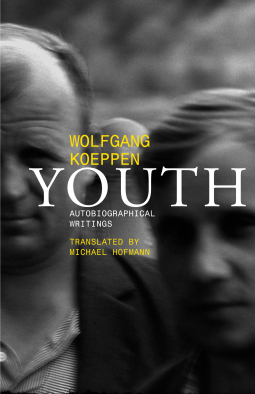 |
| Dalkey Archive Press - $14.95 - 18 Nov 2014 |
“Whether a sentence is a beautifully landscaped torrent going on for several pages or a dumbly insolent “I was Germany’s future” or one of Koeppen’s patented “or maybe…” constructions, sidestepping into freedom, it is all scrupulously managed, supple, cadenced, sumptuously lexical, expressive prose.”
A simple description what “Youth” is about does not do it justice. Just as youth is confusing, abstruse, incomprehensible, awkward and complicated, so is the pastiche we are presented with. Sentences heaped on sentences filled with descriptions of the horrors of the Great War, the aching sense of isolation and desperation teenager feel they have the monopoly on, first experiments in love and loss. “Youth” was first published in 1976, a late work of the then 70-year-old. Some of his experiences are universal, some romanticized, some a nihilistic portrayal of growing up during times of war. So to speak, he is a much more suitable proto-member of the Lost Generation, living in and through the Great War and not having the chance of comfortably choosing to be an expatriate. In a way, he is the younger brother to most of more famous writers of the Lost Generation, such as Remarque. Koeppen is eight when the Great War begins, twelve when it ended in 1918. He describes the feeling of being trapped in a war-torn country:
“(…) I thought I want to run away from this town, away from this country, flee, flee, and I traipsed in with everyone and found my seat.”
The narrative also focuses on Koeppen’s budding love for literature. After he witnessed the First World War in the small village of Ortelsburg, he returned to school in 1919. Koeppen worked in bookshops and attended lectures at the University of Greifswald later on. There are several stories and articles in newspapers by him. As is normal for many writers, he spends most of his time reading:
“Libraries attracted me. I haunted them, greedy and addicted. I was in love with the people who worked in them. I was irresistible, the librarians were helpless. They did my bidding. They opened their shelves to me, they parted from their treasures. I surrounded myself with script. I guzzled type. I forgot myself. I sat in the public square like a drunkard. The alphabet swept me away. I was a caution to the city. I was an irritation.”
A young man, drunk on prose and poetry during and after times of war is an eye-sore to the system. It is reassuring to know that he made it through.
The second story in this thin volume is more closely related to the travel writing Koeppen used to commit to in his later years. Michael Hofmann likens it to a refreshment after the bombardment of the titular story, “something plain and uncomplicated and benign”. It reads exactly like that. Once Upon A Time in Masuria is missing the fierce descriptions, the high-brow literary techniques, yes, even the subject matter. It is a short text of vignettes, revelling in nostalgia.
What I liked best about this book are Koeppen’s monumental sentences, often spanning more than a page. While it is easy to get lost in them, it is a welcome change to be treated to such well-crafted and immersive sentences. Before reading Youth, Koeppen was still a name I knew about, especially from my German AP courses during the Abitur. Tauben im Gras is widely regarded as one of the best post-war works of German literature. I always wanted to read a complete work by him rather than just fragments, now this English translation finally enabled me to do exactly that. What a pleasure!
Youth: Autobiographical Writing will be published Nov 18 2014 by Dalkey Archive Press. I received a free copy in exchange for a review through Netgalley.
Keine Kommentare:
Kommentar veröffentlichen